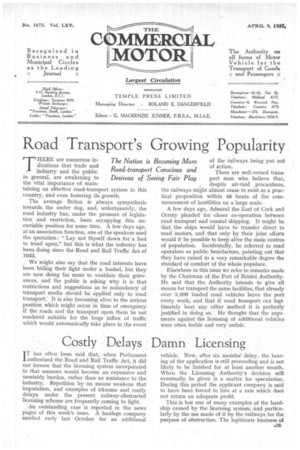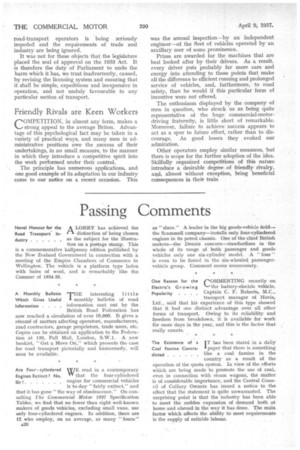Costly Delays Damn Licensing • IT has often been said that,
Page 27

Page 28

If you've noticed an error in this article please click here to report it so we can fix it.
when Parliament authorized the Road and Rail Traffic Act, it did not foresee that the licensing system incorporated in that measure would become an expensive and unwieldy burden, rather than an assistance to the industry. Repetition by no means weakens that imputation, and examples of irksome and costly delays under the present railway-obstructed licensing scheme are frequently coming to light.
An outstanding case is reported in the news pages of this week's issue. A haulage company applied early last October for an additional vehicle. Now, after six months' delay, the hearing of the application is still proceeding and is not likely to be finished for at least another month. When the Lieensing Authority's decision will eventually be given is a matter for speculation. During this period the applicant company is said to have been forced to hire at a rate which does not return an adequate profit.
This is but one of many examples of the hardship caused by the licensing system, and particularly by the use made of it by the railways for the purpose of obstruction. The legitimate business of road-transport operators is being seriously impeded and the requirements of trade and industry are being ignored.
It was not for these objects that the legislature placed the seal of approval on the 1933 Act. It is therefore the duty of Parliament to undo the harm which it has, we trust inadvertently, caused, by revising the licensing system and ensuring that it shall be simple, expeditious and inexpensive in operation, and not unduly favourable to any particular section of transport.
Friendly Rivals are Keen Workers
• COMPETITION, in almost any form, makes a strong appeal to the average Briton. Advantage of this psychological fact may be taken in a variety of practical ways, and many men in administrative positions owe the .success of their undertakings, in no small measure, to the manner in which they introduce a competitive spirit into the work performed under their control.
The principle has numerous applications, and one good example of its adaptation in our industry came to our notice on a recent occasion. This was the annual inspection—by an independent engineer—of the fleet of vehicles operated by an ancillary user of some prominence.
Prizes are awarded for the machines that are best looked after by their drivers. As a result, every driver puts probably far more care and energy into attending to those points that make all the difference to efficient running and prolonged service of vehicles, and, furthermore, to road safety, than he would if this particular form of incentive were not offered.
The enthusiasm displayed by the company of men in question, who struck us as being quite representative of the huge commercial-motordriving fraternity, is little short of remarkable. Moreover, failure to achieve success appears to act as a spur to future effort, rather than to discourage. As good losers they evoked our admiration.
Other operators employ similar measures, but there is scope for the further adoption of the idea. Skilfully organized competitions of this nature introduce a desirable degree of friendly rivalry, and, almost without exception, bring beneficial consequences in their train




















































































